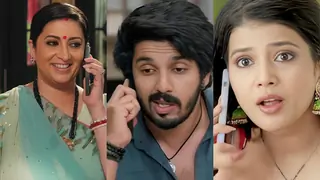Originally posted by: RadhikaS0
Sorry, am very late I know and don't know if anyone will still read this :)
I am happy with the comparison with ocean for 1 and only 1 reason. For a long time, I have been reading on this forum that Jalal is as deep as an ocean and Jodha is very shallow - like a gurgling brook and no depth, she is uni-dimensional and so on.
Just because Jalal speaks out and expresses himself and all his varied emotions and Jodha is more gracious and dignified, and generally speaks only as much as is required and does not betray her emotions, we cannot assume that only Jalal has depth and a complex character and Jodha is "flat". People forget that she was a princess and a queen and in those days, royal ladies were expected to be seen but not heard.
Perhaps yesterday's emotional tsunami from Jodha will convince everyone that she too is like the rolling ocean, full of ebbs and tides, full of undercurrents that are not overtly visible. That just because she is calm doesn't mean she is a marble statue - she also has thoughts, opinions, feelings, views, emotions, perceptions, and above all, a strong sense of self.
This tsunami has been building up inside her since the day she was forced to marry Jalal against her wishes. Though outwardly she acquiesced to her father's wishes, she was inwardly raging that she was considered nothing more than a pawn in a political alliance between her father and Jalal. A lot has been said about the famous period of ghrina and I don't want to repeat that here. But when we see Jodha now, we can understand where that ghrina was coming from. When a strong individual is treated like an item of merchandise, ghrina is but a natural consequence.
In the Tasneem track, Jodha gave a beautiful monologue on the status of women in the country. Only a woman with a strong sense of individuality can even think in such terms about the trade of women across kingdoms with impunity. Unfortunately, Jalal didn't quite understand her need for her own identity and the desire for helping other women gain their sense of self-worth. Yes, he did disallow marriage of underage girls and marriage against the wishes of the bride. But he didn't quite understand the gamut of change Jodha wanted across his sultanat and in their own relationship.
Maddy made a beautiful point that Jodha's first positive statement to Jalal was that she now trusted his judgment and knew that he trusted her. Still Jalal kept missing the signal (just like the audience) that trust and self-respect meant more to Jodha than love. In track after track, especially the Ben track, he continued to ride rough-shod on her feelings and self-respect and humiliated her publicly, interspersed with periods of friendliness and trust. Whether he trusted her or not, however, depended entirely on his own bent of mind and proof of her loyalty. Though he had started regarding her as an intelligent, talented and capable woman, he was still susceptible to insinuations against her character and loyalty.
After one year of constantly proving herself and almost sacrificing her own life, the least Jodha expected from Jalal was belief in her fidelity and a willingness to treat her as an equal partner with respect and trust. The twin assault of being accused of an illicit affair and the one-sided renunciation of their relationship completely devastated her. How could a man who claimed to love her obsessively and who proclaimed that he couldn't possibly live without her, have so little regard for her as an individual? Just because he saw and heard something, he was willing to believe that concocted evidence and not his wife? He was not even willing to inquire thoroughly into the matter before coming to a conclusion? How could Jodha accept that he could marry her at his will and leave her at his will? That he could treat her as he liked and allow others to treat her as they liked without ever thinking how she might feel about it?
Diksha very rightly compared this rejection of Jodha to the dhakka. Just as Jalal couldn't reconcile to rejection by the woman he loved, now Jodha is unable to reconcile to rejection by the man she loves. Just as he took a long time to heal and move ahead, she too now needs time to heal before she can move forward. Hence her decision to not go to Agra at the moment is a very wise one. She has to first heal herself, her sense of self, her self-esteem and her belief in Jalal's faith in her and regard for her before she can live with him again. The time out at Amer is just what she needs.
I am not saying much for Jalal because Jalal can speak for himself and there are many who speak for him. I am deeply distressed by his sense of guilt and remorse, at his willingness to leave his empire to search for her and to pacify her. He is even willing to take help from a relative stranger like Todarmal to search for his wife, which is most uncharacteristic of him. He was the most gracious husband possible when Jodha vented all her angst (just as Jodha was when he was venting to her a few days back). Even now, though he is absolutely dejected that she has refused to come with him, he has not lost his sense of purpose and I know he will move heaven and earth to convince her of his trust and his respect for her. If she doesn't come with him, he will follow her to the ends of the world, till she relents. After all, he is the man who had brought her back from the jaws of death with the power of his love. Jodha needs to also see that though his outward behaviour may have left a lot to be desired, his intentions were never suspect. That she too needs to respect him the way she expects him to respect her.
Mansi, you are right. They both should spend some time alone in Amer where "there is no pressure on them to patch up or break up", so that they are both able to heal their negative emotions. They both need to introspect and see where they went wrong and how they can take their relationship forward. Last year, Jodha had gone forcibly with Jalal from Amer to Agra. But this year, she will go willingly, on her own terms. And this time, Jalal will take her, not as a prized possession, but as an equal partner and lifelong companion.
It doesn't matter where they consummate. What is important is that this consummation is not just physical but more about their emotional and soul-level union.



























30